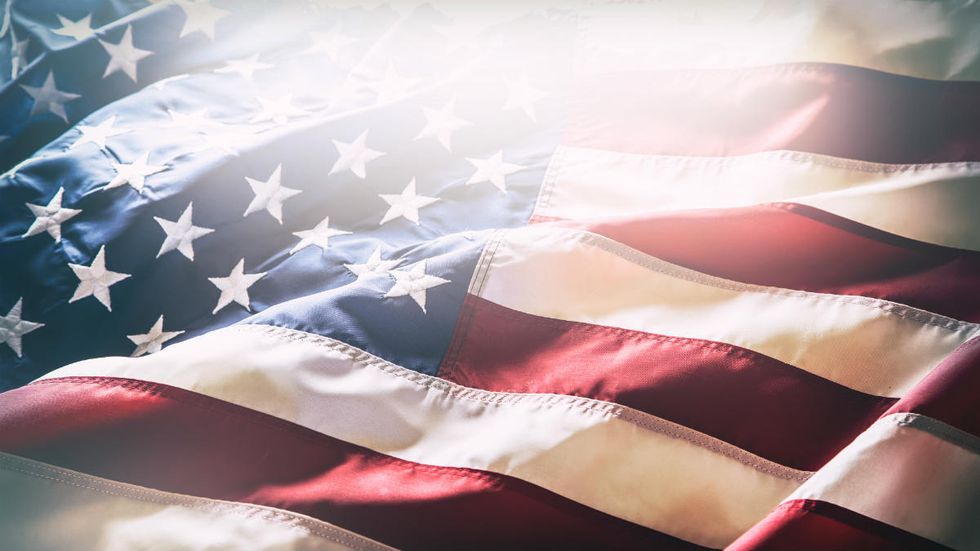
© 2024 Blaze Media LLC. All rights reserved.
The country is in uproar over the Colin Kaepernick national anthem controversy, and it's time to get a few things straight.
We all know by now that the San Francisco 49ers quarterback decided to bench himself Friday night during the playing of the Star-Spangled Banner ahead of his team's matchup against the Green Bay Packers ... and that he was promptly chided by patriots everywhere.
But something that surfaced in the midst of this debacle, which has become the latest national case study in social justice malarkey, is the call to abolish the national anthem on the premise that it's a racist battle cry.
Slate magazine posted a long-form listicle Monday on why the anthem is one of the worst things to ever happen to this country. In the piece, Carl Wilson argues that the Star-Spangled Banner is too elitist, militaristic, and simply "too damn hard to learn and to sing."
And then there was Shaun King. On Monday, the controversial Black Lives Matter activist and New York Daily News columnist penned a piece explaining "Why I'll never stand again for the 'Star-Spangled Banner'":
While it has always been known that the song was written during American slavery and that when those words about this nation being the "land of the free" didn't apply to the millions who had been held in bondage, few of us had any idea that the song itself was rooted in the celebration of slavery and the murder of Africans in America, who were being hired by the British military to give them strength not only in the War of 1812, but in the Battle of Fort McHenry of 1814. These black men were called the Corps of Colonial Marines and they served valiantly for the British military. Key despised them. He was glad to see them experience terror and death in war — to the point that he wrote a poem about it. That poem is now our national anthem.
King is referring to the third stanza of the anthem, which reads, in part, as follows:
No refuge could save the hireling and slaveFrom the terror of flight or the gloom of the grave,
And the star-spangled banner in triumph doth wave
O’er the land of the free and the home of the brave.
There's just one problem: These lyrics are describing slaves who were, as King conveniently points out, hired by the British. This song is not about killing black slaves. It's about fighting the enemy, be he a decorated British officer or the escaped slave hired to do his dirty work.
Shaun King and his allies might be surprised to learn that Francis Scott Key, a D.C. lawyer, was initially against the United States' entry into the War of 1812.
According to History.com, "Key referred to the war as 'abominable' and 'a lump of wickedness.' However, his opposition to the war softened after the British began to raid nearby Chesapeake Bay communities in 1813 and 1814, and he briefly served in a Georgetown wartime militia."
OK, the liberal Left asks, then why do we no longer sing that stanza?
According to Encyclopedia Britannica, "The third stanza is customarily omitted out of courtesy to the British." To the British — not slaves!
Why is that? Because any human being with a moral conscience knows that the enslavement and degradation of others is wrong. Slavery is an ethical stain on the American narrative, but Key, though he owned slaves, wasn't writing in defense of slavery — he didn't have to. Slavery was for the most part a given during early 19th-century America.
So what point was Key trying to make, and why did so many people find it noteworthy enough to make it the national anthem? War is ugly, but if anything is worth fighting for, it's the type of liberty and opportunity for which a country like America proudly stands. Darn right this song is militaristic. Because like it or not, ideas must be defended, especially ones as audacious and lofty as that of American liberty.
Death is lamentable; it's an unfortunate element of the human existence. But if you believe transcendent truths about human dignity and freedom aren't worth defending (sup, SCOTUS), then what do you care anyway?
And just to continue bursting the anthem-hating bubble, I'll note that Slate is not the first to point out that the Star-Spangled Banner is difficult to sing.
The following passage is from a June 2014 New York Times article, which raises the some of the same objections Wilson mentions, with a key twist:
In the early days of the Civil War, the North and South both claimed the anthem — Key was, after all, a Maryland slave owner. Only during Reconstruction did it emerge as the predominant American hymn, entrenched by its association with flag-raising ceremonies practiced during the war.
Complaints about the tune have remained mostly the same since that era — it’s foreign, it’s hard to sing, the words are not easy to remember. But even if the highest notes on "land of the free" are difficult to reach, the anthem’s hot-blooded history elevates it to the level of American iconography — a reminder that partisanship is crucial to democracy.
America is not a perfect nation. No nation is. But an anthem that is able to communicate with such passion the values of ordered liberty, democracy, and independence from tyrannical governments is an anthem worth keeping.
Slate, just move to Canada already.
#mc_embed_signup{background:#fff; clear:left; font:14px}
/* Add your own MailChimp form style overrides in your site stylesheet or in this style block.
We recommend moving this block and the preceding CSS link to the HEAD of your HTML file. */
Want to leave a tip?
We answer to you. Help keep our content free of advertisers and big tech censorship by leaving a tip today.
Want to join the conversation?
Already a subscriber?
more stories
Sign up for the Blaze newsletter
By signing up, you agree to our Privacy Policy and Terms of Use, and agree to receive content that may sometimes include advertisements. You may opt out at any time.
© 2024 Blaze Media LLC. All rights reserved.
Get the stories that matter most delivered directly to your inbox.
By signing up, you agree to our Privacy Policy and Terms of Use, and agree to receive content that may sometimes include advertisements. You may opt out at any time.


